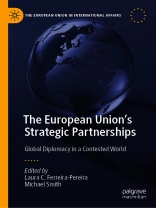This book provides a critical and updated analysis of the nature of the EU’s strategic partnership diplomacy, and of the partnerships themselves, in times of power shift and contestation. It links with key aspects of the EU’s Global Strategy; it brings together a strong list of experts who work within a clear framework for analysis; and it deals not only with the substance of the policy but also with the ways in which the policy as a whole has emerged, is conducted and might develop in the future. In offering an inclusive set of case studies and diverse perspectives, this book aims to advance both conceptualization and analysis of the implementation of the established EU partnerships. The book highlights the notion of strategic partnership as a foreign policy instrument to support EU external action in a context of multilevel change and crisis; its policy dimension as a gradually separated, but not separable policy within the Union’s external action; the institutional component given the emergence of SPs as a sort of self-preserving institutional platform allowing for denser and deeper cooperation in various policy areas; and the implications for the EU’s self-conception as an international actor with a global identity and role.
Tabela de Conteúdo
Chapter 1: Introducing the European Union’s Strategic Partnerships: Global Diplomacy in a contested World.- Part-1 : Strategic Partnerships in the European Union’s Diplomatic Practice: Evolution and Analysis.- Chapter 2 : Strategic Partnerships in EU External Action: Evolution and Analysis of a Developing Policy Instrument.- Chapter 3: Institutional Perspectives on the EU’s Strategic Partnerships: Where is the Focus and Authority?.- Chapter 4: Soft Power in the EU’s Strategic Partnership Diplomacy: The Erasmus Plus Programme.- Part-2 : The Transatlantic Partners: The United States and Canada.- Chapter 5: The European Union and the United States: competition, convergence and crisis in a strategic relationship.- Chapter 6: The EU-Canada Strategic Partnership: Challenges and Opportunities.- Part-3: Strategic Partnerships with the BRICS.- Chapter 7: European Union-Brazil Relations: A Strategic Partnership in Suspended Animation.- Chapter 8: The Partnership that Failed: Excavating the Origins, Objectives and Outcomes of the EU-Russia ‘Strategic Partnership’.- Chapter 9: The European Union and India: A Reluctant Partnership between Aspiring Global Powers.- Chapter 10: The European Union and China: Partnership in Changing Times.- Chapter 11: The European Union-South Africa Strategic Partnership: aligning interests in a multi-layered environment.- Part-4: Reaching out for Strategic Partnerships beyond the BRICS.- Chapter 12 : The EU and Mexico: The Strategic Partnership in the Context of the Global Agreement Roberto Dominguez.- Chapter 13: The EU’s strategic partnerships with Japan and South Korea: a comparative analysis of the drivers, outcomes and limitations.- Chapter 14: Conclusions: The Rise and Fall of an Idea.
Sobre o autor
Laura C. Ferreira-Pereira is Professor of Political Science and International Relations at the University of Minho and Visiting Professor at the University of São Paulo. She has published extensively on EU’s Foreign Policy in several journals and edited volumes. She is a founding member of the European International Studies Association.
Michael Smith is Honorary Professor in European Politics at the University of Warwick, and Emeritus Professor of European Politics at Loughborough University. He has published a large number of books, articles, chapters and papers on EU diplomacy, transatlantic relations and the EU’s external action in general.












